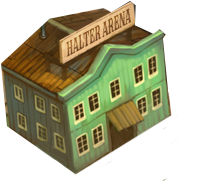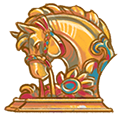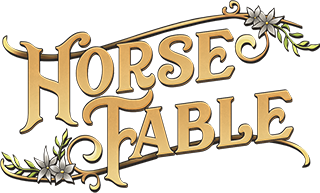Halter Arena
Wandering into the large arena you can very obviously see the arena is often used. Arena dirt is scattered all over the old carpet and it appears someone dropped their show notes. Reading the scribbles you can make out; “20 horses to automatically run the halter show, 7 to run it by noon tomorrow. Judge bias can change up the usual ranks.”

Entering Halter Shows
Halter shows are entered from the horse page, breed registry pages, or the Halter Arena. Halter shows run once there are 20 entrants. Any show that does not have 7 or more entrants by noon each day will run noon the next day.
Enter All
The enter all settings allow for you to pick how many halter and discipline shows it will enter for each horse. If you want to breed or train one day you must do it before entering halter or discipline shows. The enter all will always use up what energy a horse has left. Ex. Your horse has 100% energy then enter all will use all 100%. The enter all will default to entering discipline shows if there is less than 100% energy to be used. Ex. If your horse has 40% energy then the enter all will default to entering all discipline shows first. It is important to note that halter shows take up 20% of energy with each show, where as discipline only takes 10%.
Club Halter Shows
Clubs with crossbreed campaigns may create halter shows that can be entered by horses submitted to the generations for the crossbreed. Horses submitted to a campaign are the only ones that may enter these halter shows.
Cost & Types of Halter Shows
Halter shows are categorized by:
- Breed
- Star Value
- Genders of:
- Male (Stallions/Geldings)
- Female (Mares/Sterile Mares)
- Foals (Colts & Fillies)
Halter shows cost $10 to $50 to enter depending on the star value, with 1* being $10 and 5* being $50. Payout for halter shows includes halter points, skills, horse points, and bits.
Judging
Halter shows are judged based on breed standard, skills, and some judge bias. Each show heavily weighs breed standards and includes judge bias and a skills bonus. Each show has 3 judges who each randomly judge a breed standard stat more than the others. This means in each halter show 3 breed standard stats are judged normally and 3 have a heavier weight. Halter shows also include skills at a low % which acts as a bonus to your horse’s score.
Halter Titles
Halter shows are used to earn Halter Title Points for your horse. Halter Title Points are gained depending on your horses’ placement in the show and their star rank. Horses that are entering 5* shows will earn more halter title points than those in 1* shows. This is due to the registry valuing horses closer to the breed standard and wanting to award them more benefits. After all, sometimes a 1* horse may be better suited doing something else.
Titles are given once a horse reached specific title points. Perks are given to horses reaching gold title or higher. As of now, the perks of these titles are unknown but it is said they give wonderful benefits to breeding and training.
| Bronze (B) | 625 to 1,250 |
| Silver (S) | 1,250 to 1,875 |
| Gold (G) | 1,875 to 2,500 |
| Platinum (P) | 2,500 to 3,750 |
| Grand Supreme (GS) | 3,750 to 5,000 |
| Platinum Grand Supreme (PGS) | 5,001+ |
Skills Earnings
Halter shows award points to a random 3 skills. This means that horses gain some skills when they complete halter shows which also helps them score better in other halter shows.
Showing & Paths
Showing is one of the most important aspects of Horse Fable gameplay. Showing is a way to make money, increase horses’ level via points, and earn reputation points.
Horse Benefits
Horse Points
Points determine your horse’s level and are gained for your horse based on a percentage system. The better your horse places in a show, it will again get a higher % of points from that show. The point payout is higher for horses in the higher show ranks.
Levels
Levels are earned via the horse points won from shows. Horse level determines the training boost of its foals calculated by (Mare level+Stallion level)/10=foal training boost(TB). The more points your horse has the higher their level!
Moving Up Ranks
Horses who are trained in their performance stats will move up show ranks and tiers. This is beneficial since higher ranks and tiers earn more horse points thus more levels.

Sometimes with lots of horses or the desire to have fewer clicks in a day, a bit of a help is beneficial. The enter all and enter all II both help quickly enter shows either from horse pages or from show pages. More info is located here.
Discipline Path
Performance Stats + Good Breed Standard = Discipline Horse
The discipline path means your horse will compete in discipline shows. Horses are best suited for the discipline path if they have performance stats suited for the discipline and good breed standards. This is because disciplines use performance stats and breed standards to determine your horses score, thus placement, in a show.
Horses with poor breed standards or performance stats not suited for their discipline, typically will not excel in discipline shows. If your horse has poor breed standards and performance stats they may be best suited for a career.
Halter Path
Breed Standard + Skills = Halter Horse
The halter path means your horse will compete in halter shows. Halter horses ideally would have as close to perfect breed standards as possible and have some skills. Halter shows are tiered based on a horses star value so your horse will compete against those similar to it.
Horses with poor breed standards, such as multiple poors or fairs, typically will not do well in halter shows and will lose you money from shows due to low scores. If your horse has poor breed standards they may be best suited for a career.
Career Path
Personality + Skills + Performance Stats = Career Horse
Most any horse will excel in the career path if their personality is suited for a career. Careers also used skills to determine our horses payout for a job complete. This means the ideal career horse would first have a personality suited for the career, then throughout its life, increase its skills by completing jobs. Careers also use performance stats at a very low weight which acts as a small boost to career score and payout.
Horses with personalities not suited for any career typically will not do well in careers. This means these horses would potentially be better in the halter or discipline paths. If your horse has a personality that does not suit careers, they may do best in the discipline or halter paths.

